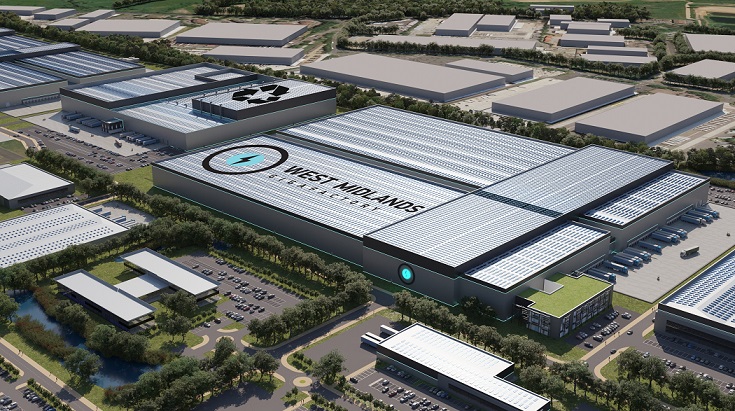The USA and UK gain significant battery development and manufacturing investment
As part of a worldwide push to increase capacity for the development and manufacturing of battery systems for a surge in sustained demand for electric vehicles, global automotive manufacturer, Toyota, has invested almost 8 billion dollars into a manufacturing facility in North Carolina, USA.
The new investment is expected to add around 3000 new jobs to the region and brings the total investment by the company into battery production of around 14 billion dollars as it reinforces its commitment to global vehicle electrification.
The new plant in North Carolina will add capacity to support battery electric vehicles (BEVs) and plug-in hybrid electric vehicles (PHEVs). An additional eight BEV/PHEV battery production lines will be added to the two previously announced, for a total of ten BEV/PHEV battery lines. In addition, the plant will also have four battery lines for Hybrid Electric Vehicles (HEVs). Production will be increased in a phased approach, with line launches planned through 2030 to reach a total production of more than 30GWh annually.
In 2021, in partnership with Toyota Tsusho, the company announced the new Liberty location with an initial investment of $1.29 billion for battery production and the creation of 1,750 new jobs. With its latest increase in funding, Toyota North Carolina has solidified its position as the company’s centre of lithium-ion battery production for North America. Overall, the site will boast seven million square feet, equating to 121 football fields of battery production.
So far, Toyota has put more than 24.6 million hybrid, plug-in hybrid, fuel cell and battery electric vehicles on the road globally. By 2025, the company plans to have an electrified option available for every Toyota and Lexus model globally.
The move into North Carolina has been met with enthusiasm locally with Senator Phil Berger believing that the additional jobs and increased capital investment are proof that both Toyota and the rural communities are prepared to support high-tech manufacturing. “I’m thankful for Toyota’s dedication to our state and I look forward to seeing it continue to grow and employ hard-working North Carolinians,” he says.
West Midlands Gigafactory
European capacity is also on the increase where the West Midlands Gigafactory, the UK centre of electrification in Coventry, is the only available site in the UK with planning permission for a large-scale battery production facility.
The West Midlands Gigafactory joint venture has confirmed that it is in advanced discussions with several of the main Asian battery manufacturers about future investment at the Coventry site.
The factory’s Coventry location is the only available site in the UK with planning permission in place for a large-scale battery production facility with capacity for up to 60GWh per annum – enough to power 600,000 electric vehicles. It is perfectly placed as a pioneering centre of excellence for battery technology and manufacturing, located at the heart of the UK’s manufacturing industry.
The ground-breaking location is the first of its kind in the UK to be offering an all-in-one approach to battery research, industrialisation, manufacturing, testing, recycling and electrified logistics designed to foster the UK’s growing battery manufacturing cluster.
Speaking earlier at the Labour Party Conference, Cllr Jim O’Boyle, Cabinet Member for Jobs, Regeneration and Climate Change at Coventry City Council said, “The West Midlands Gigafactory site in Coventry is a prime location offering future investors an all-in-one approach to battery manufacturing, research, industrialisation and recycling. In addition, we are well-positioned to become an Investment Zone, which will deliver significant additional tax incentives and breaks for future investors.”
O’Boyle went on to say that the council is now in advanced discussions with some Asian battery manufacturers who want to develop a presence in the UK.
“We hope, with the support of the UK Government, that we will secure an investor and further strengthen our region’s leadership credentials in the shift towards electrification,” he continues.
According to the organisation behind the gigafactory, the site is perfectly located at the heart of the UK’s manufacturing industry in the West Midlands with access to world-class skills, talent and supply chain capabilities in the region. It benefits from a strong transport infrastructure for the future Gigafactory’s logistics requirements, supply chain and access for up to 6,000 employees.
As the electrification revolution represents the largest shift in industrial skills for the UK in a generation, the West Midlands Gigafactory is ideally placed to be a catalyst to strengthen the region’s high value skills and research credentials as part of the UK Government’s West Midlands Investment Zone.
In recognition of the strategic importance of this project, an unprecedented regional incentives package will be available to the eventual occupier. This is expected to create favourable conditions for local taxation and access to clean, sustainable power that a world-class battery facility requires.
The West Midlands investment is welcome news after the demise of the Britishvolt facility in the north east. Since then, other players have expressed various levels of interest in setting up battery manufacturing facilities in the UK including Tesla and Tata.
The level of interest shown by Tesla is so far speculative with a possibility that there could be an announcement towards the end of this year of the company setting up a plant to work alongside its other battery manufacturing sites around the world in the USA, China and Germany.
Tata is likely to build a gigafactory in the West Country close to the M5 in a move that will see an improvement in the battery supply chain for Tata’s Jaguar Land Rover (JLR) group. The company said in July that it would invest £4 billion in the creation of the UK Gigafactory and provide over half of the UK battery demand by 2030.
- UK manufacturing steps up to COVID-19 crisis - April 2, 2020
- Clustering Innovation - March 12, 2020
- A Global Monitor - March 6, 2020

